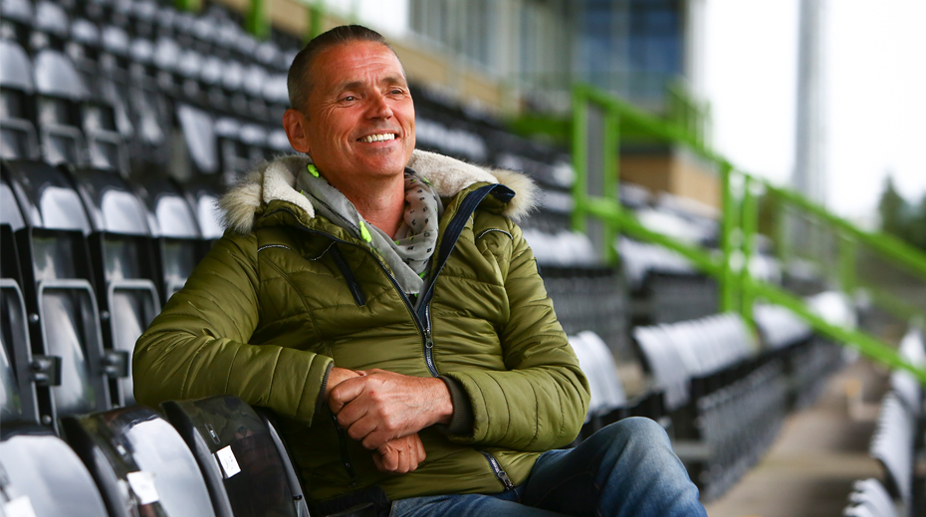Centre approves uniform protection protocol for users of Indian grid
The Central Electricity Authority (CEA) on Saturday said it has approved the uniform protection protocol for users of the Indian grid for implementation on a pan-India basis.
Founded in 1889, Forest Green Rovers were promoted to the professional leagues in May.

Forest Green Rovers owner Dale Vince (Photo: AFP)
English football club Forest Green Rovers, run by a former nomad turned renewable energy entrepreneur, are proudly boasting their credentials as a pioneer in environmental sustainability.
As at every football ground in the country, chips, pies and beer are on offer at New Lawn, their 5,000-capacity, eco-friendly ground in Nailsworth, a 6,000-strong town in the picturesque rolling Cotswold Hills of Gloucestershire, southwest England.
But there are no hot dogs — meat is banned and all the cuisine is vegan. The pitch is kept lush with captured rainwater, the paint contains no chemicals, and 20 percent of the energy comes from solar panels on the roofs of the stands.
Advertisement
There are charging points for electric cars and their lime green and black team strip bears the logo of marine wildlife conservation group Sea Shepherd UK.
Founded in 1889, Rovers were promoted to the professional leagues in May. They opened their campaign in the fourth-tier League Two on August 5.
Despite their name, Forest Green only started going green when Dale Vince took over as chairman in 2010.
“We felt we had an opportunity to bring our message to an audience that really weren’t exposed to it typically,” he said.
“The audience I’m talking about is football fans and the message is around the environment and things that we all need to do to live more sustainably.
“So we thought, this is great, this is not preaching to the choir, let’s go in there and talk about food and talk about transport.”
Vince, 53, founded Ecotricity, which claims to be the world’s first green electricity company, supplying power from renewable sources.
The former New Age Traveller sees himself more as an environmentalist than a businessman. Vince built his first wind turbine in 1990, when he was still living in a camper van on a hill near the stadium.
Success on the pitch is critical to spreading the eco message, he says.
“We have an organic pitch. That doesn’t mean anything if it’s not a great football pitch,” he adds.
Vince dreams of moving his club two divisions up to the Championship, one step below the top Premier League, and aims within four years to open an Eco Park with a new stadium designed by Zaha Hadid Architects.
The plans feature what Vince describes as the first stadium made entirely from wood, alongside an incubator for green start-up businesses.
At the club’s current site, its passionate groundsman Adam Witchell describes the challenges of managing an entirely organic vegan pitch.
“We can’t just use organics. We don’t use anything that’s derived of an animal,” he says, ruling out options such as organic fertilisers made from animal faeces.
“It’s healthier for myself, it’s healthier for the bees and, fundamentally, it’s healthier for the players.”
Witchell also has a “more hands-on” approach than usual: he weeds the grass manually.
What goes for the pitch — mowed by a solar-powered robot — also goes for the food served to players and spectators.
“I thought, what a fantastic thing to do, to share really good food with a really large audience,” chef Em Franklin says, of taking on the club’s kitchen.
Franklin describes the vegan diet as “easily accessible” — proven by increasing food sales at the club — and one which also benefits the players.
“With regards to getting the nutrients, and especially with athletes, it’s not hard to get that amount of protein,” she says, preparing a match day dish of chickpea curry.
Manager Mark Cooper also sees improved results on the pitch, speaking to AFP after Forest Green Rovers were beaten by 1-0 by third-tier visitors Milton Keynes in the League Cup first round on Tuesday.
“In extra time, we looked as fit as a team in the league above us,” Cooper said.
While not a vegan himself, he gave up meat six months ago and is positive about his new diet: “I loved a bacon sandwich on a Sunday morning, but not any more!”
Veganism is not enforced on the players in their private lives, away from the club, but, like Cooper, some have opted to go vegetarian.
Some of the fans are less enthusiastic about the choice of food on offer at New Lawn.
“(It) resembles cardboard and chilli sauce,” says Paul, of his unfinished vegetable burger. “I’m not against vegan food; I just wish there was a choice.”
Fellow diner Martin, however, enjoyed his vegan meal: “It’s not my most favourite food but, when you’re hungry you have to eat… If it looks good, I will try it.”
But the football fans do agree when it comes to beverages, deeming tea with soya milk undrinkable. Beer, they conclude, is a preferable alternative.
Advertisement